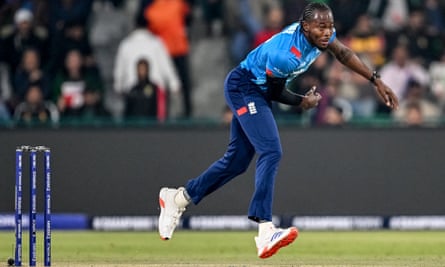The England players who hit the golf course on Sunday morning probably did the right thing, really. Back at the team hotel they were replaying the defeat against Australia the previous night on a jumbo‑sized screen, with the gentle flute muzak in the lobby barely softening the sight of Josh Inglis going gangbusters.
Plenty went back to their own struggle to tee off with the bat. At the 30-over mark, England were 200 with just two down, only to finish 351 for eight. It was their highest score at a global event, the highest by any side at a Champions Trophy. But it was still only par and swiftly bumped down to No 2 as regards the second of those two records.
Well in excess was a must given the evening conditions that followed and Jos Buttler, among those to let things slip when holing out on 23, tried to mask his disappointment yet again. Australia were ruthless, while England did hint at improvement before things unspooled. But even with the semi-finals not yet out of reach, there are growing shades of Joe Root’s final days as Test captain here.
The more authentic post-match reaction came from Ben Duckett. In contrast to the Gordon Brown smile that Buttler has tried through this run of winter defeats, a glum Duckett admitted he was “pretty flat”. And not without good reason. After leaving India with a groin injury and questions swirling about his ability to kick on after starts, the opener’s wonderfully stitched 165 had set a platform for colleagues to exploit.
It’s here where, along with Buttler and Harry Brook, Liam Livingstone enters the conversation. The last recognised batter, strolling out at 280 for five with nine overs to go, Livingstone muscled one typically brawny six to the short square boundary before taking on the longer one to perish for 14 off 17 balls. Had Jofra Archer not raided 21 at the death, a pretty convincing defeat would have become a shellacking.
In contrast to the late dew that fell at the back end of the chase, Livingstone said on Sunday that two softening balls and a slowing pitch were the problem. And in fairness, No 7 is a tough, specialist role; sometimes tasked with putting out a fire, other times needing to squeeze the trigger from the get-go. But just shy of 100 white-ball caps – 37 one-day internationals, 60 Twenty20s – and a senior in the squad aged 31, these are also the moments across five International Cricket Council tournaments he is still truly to seize.
Indeed, despite some bilateral success these past 12 months, Livingstone averages 15.4 with the bat when there is a global trophy at stake, with a best of 33. That 33 is also the closest he has come to nailing the role on the big stage, only to be caught hitting into the wind needing 25 from 17 balls to beat South Africa in the T20 World Cup last year. Had he got England over the line, the far trickier semi‑final against India, on a turner in Guyana, would have been swerved.
For all this, Livingstone is one of the first names in the XI, those leggies and off-breaks – a creditable one for 47 from seven overs on Saturday night – making him England’s next best spin option after Adil Rashid. They have slightly painted themselves into a corner with the squad overall, as the reserves are Tom Banton, a top‑order bat, and three quicks in Saqib Mahmood, Gus Atkinson and Jamie Overton.
after newsletter promotion

It was a tough first outing for the frontliners, Archer and Mark Wood fading after fearsome starts and, in combination with Brydon Carse, whose back-of-a-length heft was too easily pulled by Inglis and co, they shipped 8.5 runs per over combined. There is no left-armer, a shortage of variation among the right-armers, and no frontline spinner should they somehow kick on and play the Dubai semi-final.
“Like anything, it can take a little bit of time,” Livingstone said, when asked about Brendon McCullum’s impact since becoming white-ball head coach this year. “But we don’t really have time on our side in this tournament, for sure. Hopefully that turnaround comes in the next game and we can ride away from there.”
England stay put for now, Afghanistan next up in Lahore on Wednesday – another day‑nighter in which again conditions could lurch – before switching to Karachi to play South Africa three days later. They may yet ride away to make Buttler’s smile less forced. But as per their past two global events, they continue to do it the hard way.

.png) 2 months ago
20
2 months ago
20













































